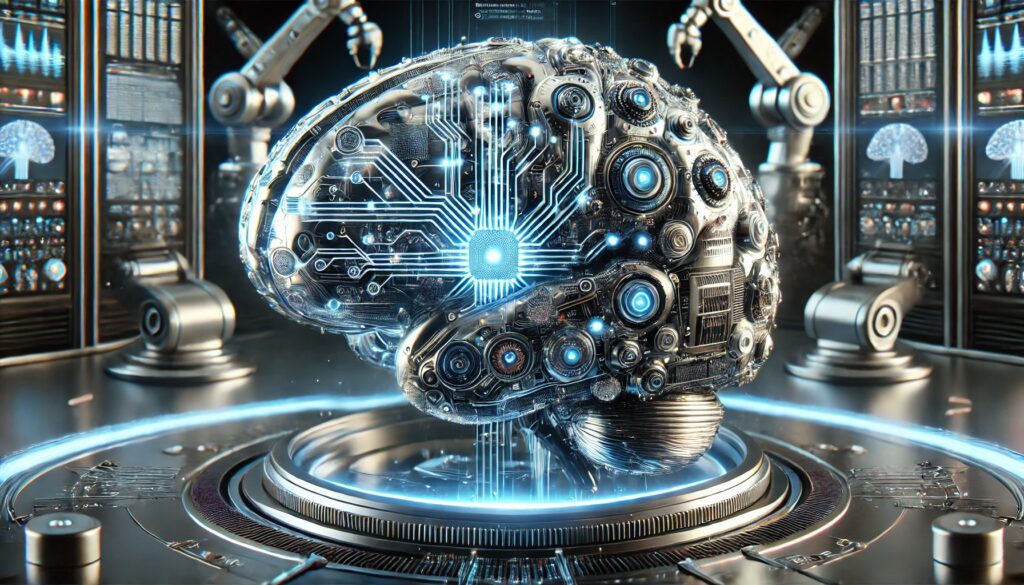Unleashing the Power of Quantum Computing to Transform AI and Solve Complex Challenges

Quantum Artificial Intelligence (QAI) stands at the confluence of two revolutionary technological domains: quantum computing and artificial intelligence. As researchers and technologists merge these fields, QAI promises to redefine the landscape of computational power and intelligence. This article delves into how QAI is shaping the future, exploring its principles, applications, and potential impact on various industries.
The Convergence of Quantum Computing and Artificial Intelligence
The synergy between quantum computing and AI heralds a new era of innovation. Quantum computing offers unprecedented processing capabilities, which, when harnessed by AI algorithms, can solve complex problems far beyond the reach of classical computers. This convergence is not just a theoretical possibility but a burgeoning reality, set to transform diverse sectors.
Defining Quantum Artificial Intelligence
Quantum Artificial Intelligence combines the principles of quantum mechanics with AI algorithms, leveraging the unique properties of quantum bits (qubits) to enhance machine learning and problem-solving capabilities. This fusion aims to exploit quantum phenomena to perform computations more efficiently and effectively than classical systems.
Historical Background of Quantum Computing

Quantum computing’s journey began in the early 1980s with Richard Feynman’s proposition that quantum systems could simulate complex physical processes. Over the decades, advancements in quantum theory and technology have laid the groundwork for today’s burgeoning quantum computing landscape.
The Fundamentals of Quantum Mechanics in AI
Quantum mechanics underpins the operations of quantum computing, introducing concepts like superposition and entanglement that differ fundamentally from classical computing. Understanding these principles is crucial to grasp how they can be applied to enhance AI.
Quantum AI can improve outcomes in ML by improving upon tried and tested ML techniques. This will lead to improved prediction rates and pattern recognition but can also be applied for unsupervised learning, clustering, and anomaly detection.”
– The Quantum Insider
Quantum Bits (Qubits) and Their Significance
Qubits are the basic units of quantum information. Unlike classical bits, which represent data as 0s or 1s, qubits can exist in multiple states simultaneously, thanks to superposition. This property enables quantum computers to process a vast amount of information concurrently, significantly boosting computational power.
Superposition and Entanglement: Key Concepts
- Superposition: Allows qubits to be in multiple states at once.
- Entanglement: Links qubits in such a way that the state of one qubit instantly influences the state of another, regardless of distance.
These phenomena are pivotal in developing quantum algorithms that surpass classical computational limitations.
Quantum Algorithms: Transforming AI Capabilities

Quantum algorithms leverage the unique properties of qubits to perform tasks more efficiently than classical algorithms. Two prominent examples are Grover’s and Shor’s algorithms, which illustrate quantum computing’s potential to revolutionize data processing and cryptography.
Grover’s Algorithm and Enhanced Data Search
Grover’s algorithm offers a quadratic speedup in unstructured data search, making it significantly faster than classical search algorithms. This enhancement has profound implications for AI, enabling quicker and more efficient data retrieval and analysis.
Shor’s Algorithm: Revolutionizing Cryptography

Shor’s algorithm can factor large integers exponentially faster than the best-known classical algorithms. This capability threatens current cryptographic systems, prompting the need for quantum-resistant encryption methods and opening new avenues for secure communication in AI.
Quantum Machine Learning: Bridging the Gap
Quantum machine learning (QML) integrates quantum computing with machine learning techniques, aiming to accelerate and improve learning processes. QML has the potential to solve complex problems in fields such as natural language processing, image recognition, and predictive analytics.
Quantum Neural Networks: The Next Frontier
Quantum neural networks (QNNs) are an emerging field where quantum computing principles are applied to neural network models. QNNs promise to enhance pattern recognition, data classification, and decision-making processes, surpassing the capabilities of classical neural networks.
Quantum Annealing for Optimization Problems
Quantum annealing is a quantum computing technique used to solve optimization problems. By leveraging quantum fluctuations, quantum annealing can find optimal solutions more efficiently than classical methods, with significant implications for AI-driven optimization tasks.
Applications of Quantum AI in Various Industries
- Healthcare: Revolutionizing Drug Discovery and Genomics
- In healthcare, QAI can accelerate drug discovery by simulating molecular interactions at unprecedented speeds. Additionally, it can enhance genomic analysis, leading to personalized medicine and advanced treatments for complex diseases.
- Finance: Enhancing Risk Assessment and Fraud Detection
- In the finance sector, QAI can improve risk assessment models, making them more accurate and responsive to market changes. It also enhances fraud detection systems by identifying patterns and anomalies that classical systems might miss.
- Cybersecurity: Strengthening Defense Mechanisms
- QAI can bolster cybersecurity by developing advanced encryption techniques and real-time threat detection systems. Its ability to process vast amounts of data swiftly makes it a formidable tool against evolving cyber threats.
Quantum AI And Cognitive Robotics
Quantum AI and cognitive robotics represent the frontier of artificial intelligence and robotics research. Combining the principles of quantum computing with AI and cognitive robotics has the potential to bring about significant advancements in how robots perceive, learn, and interact with the world.
Cognitive Robotics
Cognitive Robotics involves developing robots with advanced cognitive abilities, allowing them to perceive, learn, reason, and make decisions in a manner similar to humans. Key aspects include:
- Perception and Sensing:
- Cognitive robots are equipped with advanced sensors and perception systems, enabling them to understand and interpret their environment. This includes visual, auditory, and tactile sensing.
- Learning and Adaptation:
- These robots can learn from experience and adapt their behavior based on new information. Machine learning algorithms play a crucial role in enabling this capability.
- Reasoning and Decision-Making:
- Cognitive robots can perform complex reasoning and make decisions based on incomplete or uncertain information. This involves the use of AI techniques such as probabilistic reasoning and planning.
- Natural Interaction:
- Cognitive robots are designed to interact naturally with humans. This includes understanding and generating natural language, recognizing emotions, and engaging in social behaviors.
Synergy: Quantum AI and Cognitive Robotics
Combining Quantum AI with cognitive robotics could lead to breakthroughs in several areas:
- Faster Learning and Adaptation:
- Quantum computing could significantly speed up the learning processes for cognitive robots, allowing them to process and learn from large amounts of data in real-time.
- Advanced Perception and Understanding:
- Quantum-enhanced machine learning algorithms could improve the perception and interpretation capabilities of cognitive robots, enabling them to understand complex and dynamic environments more accurately.
- Efficient Decision-Making:
- Quantum optimization algorithms can help cognitive robots make better decisions by finding optimal solutions to complex problems quickly and efficiently.
- Improved Human-Robot Interaction:
- Advanced natural language processing powered by Quantum AI could enhance the ability of cognitive robots to understand and respond to human language more effectively, making interactions more intuitive and natural.
- Complex Problem Solving:
- Quantum cognitive robots could tackle problems that are currently beyond the reach of classical AI and robotics, such as large-scale environmental modeling, intricate medical diagnoses, and sophisticated autonomous systems.
Challenges and Limitations of Quantum AI

Technical Barriers and Current Hurdles
Despite its promise, QAI faces significant technical challenges, including qubit stability, error rates, and scalability. Overcoming these hurdles is crucial for the practical implementation of QAI technologies.
Ethical and Societal Implications
The rise of QAI also brings ethical and societal considerations, such as the impact on employment, privacy, and security. Addressing these issues is essential to ensure the responsible development and deployment of QAI.
Future Prospects and Research Directions
Emerging Trends in Quantum AI Research
Research in QAI is rapidly advancing, with new algorithms, hardware improvements, and innovative applications emerging regularly. Staying abreast of these trends is vital for understanding the future trajectory of QAI.
Potential Breakthroughs on the Horizon
Potential breakthroughs in QAI could revolutionize fields ranging from healthcare to finance, leading to more efficient, accurate, and powerful AI systems. These advancements promise to unlock new capabilities and transform how we approach complex problems.
Conclusion
Quantum Artificial Intelligence stands at the cusp of transforming technology as we know it. By merging the principles of quantum computing with AI, we can unlock new levels of computational power and intelligence, paving the way for groundbreaking advancements across various industries. As we navigate the challenges and harness the potential of QAI, we are poised to enter a new era of technological innovation and discovery.
FAQ’s
How does quantum computing benefit AI?
Quantum computing can process vast amounts of data simultaneously due to the unique properties of qubits, which can represent multiple states at once (superposition) and be entangled with each other. This capability can significantly accelerate AI algorithms, particularly in areas like optimization, where classical computers struggle with scalability and speed.
What are some real-world applications of QAI?
Applications of QAI include optimization in logistics, drug discovery through enhanced molecular simulations, financial modeling, cryptography, and even space exploration. For instance, NASA’s Quantum Artificial Intelligence Laboratory (QuAIL) is exploring how quantum computing can tackle complex optimization problems in aeronautics and space sciences.
What are the applications of Quantum AI?
- Optimization Problems: QAI can optimize complex systems, such as supply chains, logistics, and traffic management, much more efficiently than classical methods.
- Drug Discovery: Quantum simulations of molecular structures can accelerate the identification of new drugs and materials.
- Financial Services: QAI can enhance portfolio optimization, risk management, and predictive analytics in finance.
- Artificial Intelligence: Quantum computing can improve machine learning models, enabling faster training and more accurate predictions (Nature) (Quantinuum).
Who are the major players in Quantum AI?
Several institutions and companies are leading the way in QAI research:
- Google Quantum AI: Google is working on developing quantum processors and exploring quantum algorithms to solve AI-related problems.
- NASA’s Quantum Artificial Intelligence Laboratory (QuAIL): NASA’s QuAIL is focusing on applying quantum computing to optimize and solve complex problems in space exploration and aeronautics.
- IBM Quantum: IBM provides cloud-based quantum computing services and is working on practical applications of quantum computing in AI.
- Quantinuum: Formed from a merger involving Honeywell Quantum Solutions, Quantinuum is advancing quantum computing and AI applications across various industries (Nature) (Quantinuum) (OurCrowd).
What challenges does Quantum AI face?
- Hardware Limitations: Current quantum computers have a limited number of qubits and are prone to errors due to quantum decoherence.
- Algorithm Development: Creating efficient quantum algorithms that can outperform classical algorithms for a wide range of tasks is still a work in progress.
- Scalability: Scaling up quantum systems while maintaining coherence and reducing error rates is a significant challenge.
- Interdisciplinary Expertise: Quantum AI requires expertise in quantum physics, computer science, and machine learning, necessitating collaborative efforts across these fields
What industries can benefit the most from Quantum AI?
- Healthcare and Drug Discovery: Quantum AI can simulate molecular interactions at a quantum level, potentially speeding up the discovery of new drugs and materials.
- Finance: It can optimize portfolio management, improve risk assessment, and enhance fraud detection through better predictive models.
- Supply Chain and Logistics: QAI can solve optimization problems related to routing and supply chain management more efficiently.
- Climate Modeling: QAI’s advanced computational power can lead to more accurate climate models, helping to predict and mitigate the effects of climate change.
- Cybersecurity: Quantum AI can develop more secure encryption methods that are resistant to attacks from classical computers.
What progress has been made in Quantum AI research?
Significant progress has been made by various research institutions and companies:
- Google’s Quantum AI Lab: Focuses on developing quantum processors and algorithms to solve complex machine learning problems.
- NASA’s Quantum Artificial Intelligence Laboratory (QuAIL): Explores quantum computing’s potential to enhance AI in space exploration and aeronautics.
- IBM Quantum: Offers cloud-based quantum computing services and works on practical applications in AI and beyond.
- Quantinuum: Advances quantum computing and AI applications across various industries, including computational chemistry and machine learning
How does Quantum AI impact the development of Artificial General Intelligence (AGI)?
Quantum AI can significantly impact AGI by providing the computational power needed to process and learn from vast amounts of data more efficiently. This can lead to the development of more advanced models that can think and learn like humans, potentially revolutionizing fields such as computer vision, language processing, and robotics
Resources and Case Studies:
Resources
Official Publications and Reports
- National Quantum Initiative Act
- Description: The official documentation and reports on the United States’ strategy for advancing quantum information science.
- Link: National Quantum Initiative Act
- Quantum Computing: Progress and Prospects
- Description: Comprehensive report by the National Academies of Sciences, Engineering, and Medicine on the current state and future prospects of quantum computing.
- Link: Quantum Computing Report
Books
- “Quantum Computation and Quantum Information” by Michael A. Nielsen and Isaac L. Chuang
- Description: A foundational text that provides an in-depth introduction to the principles and techniques of quantum computing.
- Link: Amazon Link
- “Quantum Machine Learning: What Quantum Computing Means to Data Mining” by Peter Wittek
- Description: Explores the intersection of quantum computing and machine learning, providing insights and examples of quantum algorithms.
- Link: Amazon Link
Online Courses and Lectures
- Coursera: Quantum Computing
- Description: An online course that introduces the basics of quantum computing and its applications.
- Link: Coursera Quantum Computing
- edX: Quantum Mechanics for Scientists and Engineers
- Description: A course designed to provide a solid foundation in quantum mechanics with applications to quantum computing.
- Link: edX Quantum Mechanics
Research Papers and Articles
- “Quantum Supremacy Using a Programmable Superconducting Processor” by Google AI Quantum
- Description: This landmark paper demonstrates quantum supremacy and the potential of quantum computing.
- Link: Nature Article
- “Quantum Machine Learning” by Jacob Biamonte et al.
- Description: A comprehensive review of the field of quantum machine learning.
- Link: Nature Article
Databases and Tools
- Qiskit
- Description: An open-source quantum computing software development framework.
- Link: Qiskit
- Google Cirq
- Description: A Python library for writing, manipulating, and optimizing quantum circuits.
- Link: Google Cirq
Conferences and Workshops
- IEEE Quantum Week
- Description: An annual conference that brings together researchers and practitioners to discuss advancements in quantum computing.
- Link: IEEE Quantum Week
- Quantum Information Processing Conference
- Description: A leading conference on quantum information science and technology.
- Link: QIP Conference
Case Studies
Google’s Quantum Supremacy
- Overview: In 2019, Google announced that its quantum computer, Sycamore, had achieved quantum supremacy by performing a complex computation that would be infeasible for classical computers.
- Impact: Demonstrated the potential of quantum computing to solve problems beyond the capabilities of classical systems, validating decades of theoretical research.
- Further Reading: Google AI Blog
IBM’s Quantum Computing in Healthcare
- Overview: IBM has partnered with various healthcare institutions to explore the applications of quantum computing in drug discovery and genomics.
- Impact: Enabled more precise modeling of molecular interactions and accelerated the analysis of genetic data, potentially leading to breakthroughs in personalized medicine.
- Further Reading: IBM Research Blog
Volkswagen’s Quantum Traffic Management
- Overview: Volkswagen has utilized quantum computing to optimize traffic flow in urban areas, reducing congestion and improving efficiency.
- Impact: Demonstrated the practical applications of quantum computing in real-world scenarios, highlighting its potential to address complex logistical problems.
- Further Reading: Volkswagen Quantum Project
D-Wave’s Quantum Annealing for Optimization
- Overview: D-Wave has deployed quantum annealing systems to solve optimization problems in various industries, including manufacturing and finance.
- Impact: Showcased the effectiveness of quantum annealing in finding optimal solutions faster than classical methods, providing competitive advantages in operations and strategy.
- Further Reading: D-Wave Success Stories
Honeywell’s Quantum Solutions in Aerospace
- Overview: Honeywell has applied quantum computing to enhance the design and simulation processes in aerospace engineering.
- Impact: Improved the precision and efficiency of simulations, leading to better performance and reliability of aerospace components.
- Further Reading: Honeywell Quantum Computing
These resources and case studies provide a comprehensive overview of how quantum artificial intelligence is advancing and its practical applications across various industries. They illustrate the transformative potential of QAI and guide further exploration into this pioneering technology.





